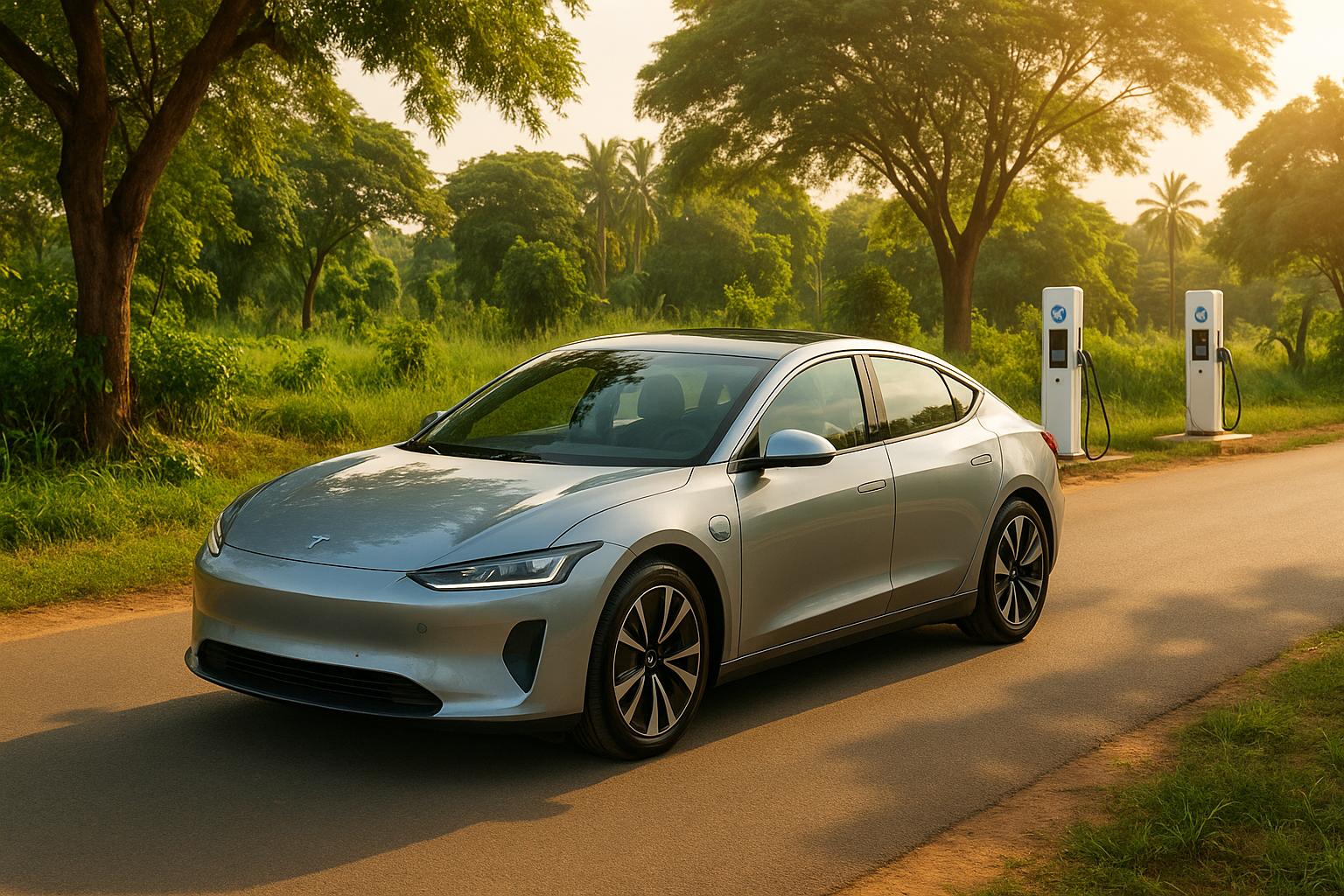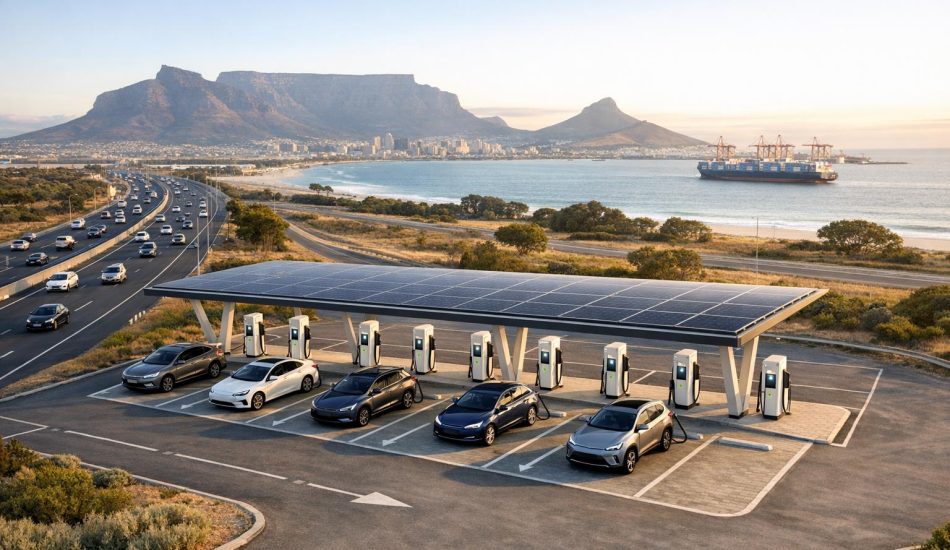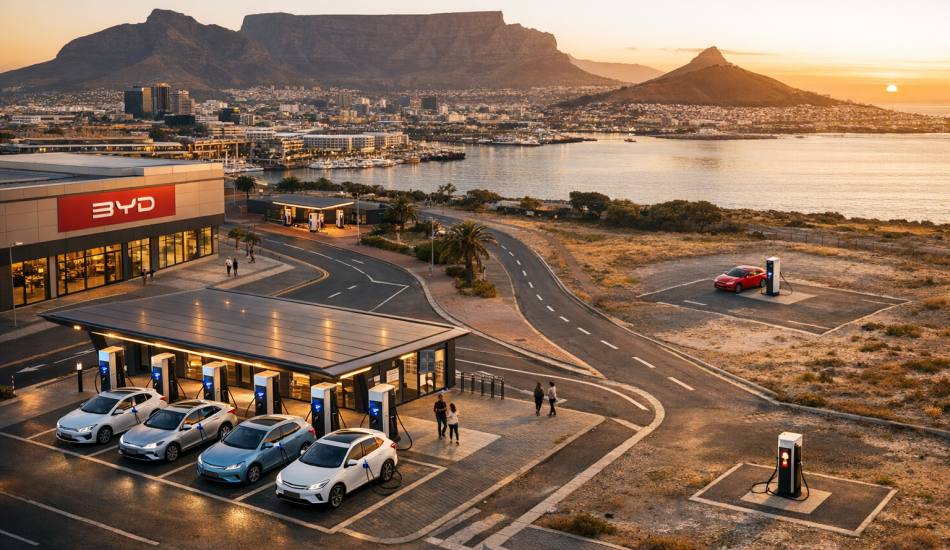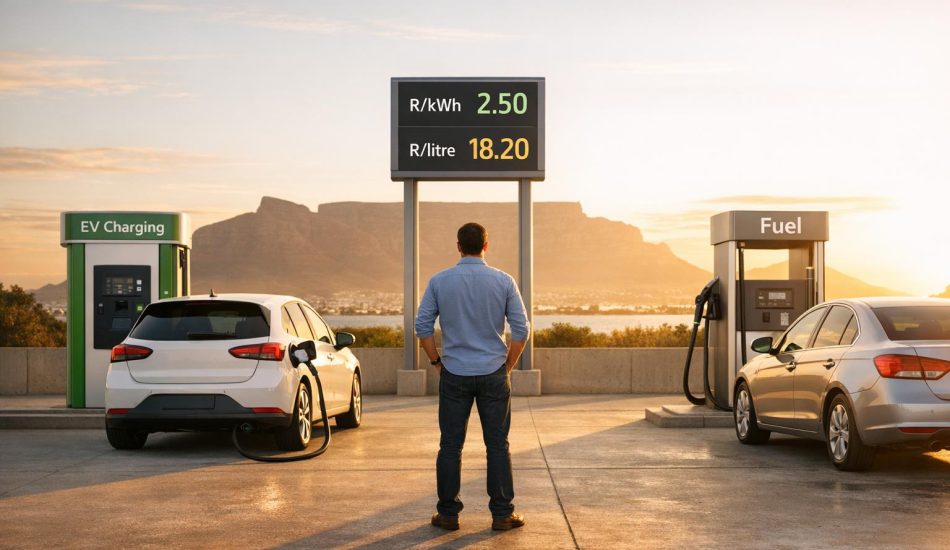
Electric vehicles (EVs) are gaining attention in Nigeria as petrol prices soar to ₦700–₦1,000 per liter. Switching to EVs can save up to 80% in running costs, with models like the Hyundai Kona costing ₦9.60–₦16 per kilometer, compared to ₦48–₦56 per kilometer for a Toyota Corolla. Beyond cost savings, EVs help reduce air pollution and reliance on imported fuel, aligning with Nigeria’s energy goals. However, high upfront costs, limited charging infrastructure, and unclear policies present hurdles.
Key Points:
- Popular EVs & Prices:
- Nissan Leaf: ₦10.8 million
- Hyundai Kona (locally assembled): Mid-range
- Tesla Model 3: ₦100–₦115 million
- Challenges:
- Few charging stations, frequent power outages.
- High import duties and limited financing options.
- Lack of supportive policies for EV adoption.
- Opportunities:
- Local assembly (e.g., Hyundai Kona by Stallion Group) may lower costs.
- Solar-powered charging hubs like Foltï Technologies‘ eDryv project in Lagos.
- Government plans for 3,000 charging stations annually starting in 2030.
Platforms like EV24.africa simplify EV purchases by handling importation and registration. With proper planning, EVs offer long-term savings and a cleaner alternative to gasoline cars.
Can Electric Cars actually work in Nigeria?
Electric Car Models and Prices in Nigeria
Nigeria’s electric vehicle (EV) market has grown to include a mix of budget-friendly and high-end options. Knowing the available models and their price ranges is key to understanding the dynamics of this emerging market.
Popular EV Models in Nigeria
Hyundai Kona Electric
This model combines a stylish interior, advanced safety features, and a battery range well-suited for city driving.
Tesla Model 3
A premium choice in Nigeria, the Tesla Model 3 stands out for its cutting-edge technology, including autopilot and over-the-air updates. It’s a great pick for those prioritizing top-tier performance and sleek design.
Nissan Leaf
Globally recognized for its dependability and efficiency, the Nissan Leaf is compact and practical – perfect for daily commutes and a great entry point for first-time EV owners.
BYD Yuan
The BYD Yuan reflects the growing influence of Chinese EVs in Nigeria. It’s an affordable option that still delivers on modern features and solid performance.
Kia Soul EV
With its unique design and roomy interior, the Kia Soul EV is a family-friendly electric crossover that blends practicality with innovation.
EV Price Ranges
The cost of EVs in Nigeria varies based on factors like features, import status, and technology. Entry-level models typically offer basic features and a moderate range, ideal for city use. Mid-range options balance affordability with better performance and extra features, while premium vehicles boast advanced battery systems, longer ranges, and state-of-the-art technology.
Several elements influence these prices. Import duties, tariffs, and fluctuations in currency significantly impact the final cost. Buyers also have the option of purchasing used EVs, which are generally cheaper than brand-new ones. However, it’s important to consider factors like battery condition and warranty when opting for a pre-owned vehicle.
Efforts to assemble EVs locally are starting to take shape, which could lower costs by reducing import-related expenses. As these initiatives gain traction, the Nigerian EV market is expected to become even more competitive.
EV Model Comparison
Entry-level models like the Nissan Leaf are reliable and budget-friendly. Mid-range vehicles, such as the Hyundai Kona Electric and BYD Yuan, strike a balance between cost and features. On the other hand, premium models like the Tesla Model 3 offer cutting-edge technology and extended driving ranges.
When choosing an EV, it’s not just the sticker price that matters. Factors like battery technology, availability of service centers, and after-sales support significantly impact long-term ownership costs. Buyers should weigh all these aspects to find an electric vehicle that aligns with their needs and expectations.
Challenges Facing EV Adoption in Nigeria
Nigeria faces a range of challenges when it comes to adopting electric vehicles (EVs). These include infrastructure issues, high costs, and unclear policies that together slow down progress.
Infrastructure Problems
One of the most obvious hurdles is the lack of charging infrastructure. Public fast-charging stations are rare, even in major cities, and rural or semi-urban areas are almost completely without them [6, 8, 11]. For many potential EV owners, this raises a big question: What happens if I run out of power during my daily commute or a longer trip?
"A sustainable EV ecosystem requires robust infrastructure and this is where Nigeria faces its most visible shortfall." – Bulls Capital
The issue is made worse by frequent power outages and the absence of battery-swap stations, which further erode confidence in EV reliability [7, 8, 10].
Some innovative efforts are, however, starting to address these problems. In April 2025, Foltï Technologies introduced eDryv in Lagos, a solar-powered ride-hailing service. Their fleet includes Dayun-branded electric MPVs and SUVs, which boast driving ranges of up to 279 miles (450 km). The service is supported by solar charging hubs and a 460 kWh energy storage facility located in Victoria Island. This project highlights how renewable, off-grid power sources can help tackle electricity supply issues.
To close the infrastructure gap, the Nigerian government has announced plans to install 3,000 charging stations annually starting in 2030. Additionally, solar-powered charging stations are gaining traction in areas without reliable grid access [7, 9].
Still, these infrastructure challenges are only part of the story. The financial burden of owning an EV adds another layer of difficulty.
Affordability and Financing Issues
The high upfront cost of EVs remains a major barrier. Even the most basic electric models are more expensive than their gasoline-powered counterparts. On top of that, hefty import duties make EVs even less accessible, restricting ownership mostly to wealthier individuals and businesses.
But financial and infrastructure challenges aren’t the only obstacles. A lack of supportive policies further complicates the situation.
Policy and Regulatory Gaps
Nigeria has yet to develop comprehensive policies to encourage EV adoption. Unlike other countries that offer tax breaks, rebates, or reduced import duties, Nigeria lacks similar incentives.
"Key challenges consist of increased initial prices, unstable electricity supply, lack of charging infrastructure, and low consumer awareness." – 6Wresearch
The process of importing EVs is another headache. Complex procedures and high tariffs push costs even higher. Additionally, there’s little clarity around regulations for EV safety standards, charging station installations, and grid integration, which makes investors and service providers hesitant to enter the market. Without government-led campaigns to educate consumers, awareness about EVs remains low, further slowing adoption.
sbb-itb-99e19e3
Opportunities and Solutions
Nigeria’s electric vehicle (EV) market presents a chance to reshape transportation by addressing environmental concerns, boosting the economy, and embracing technological advancements. These opportunities tackle the challenges of cost, infrastructure, and policy gaps highlighted earlier.
Climate and Economic Advantages
Electric vehicles offer a cleaner alternative to traditional cars, helping reduce urban air pollution and cutting Nigeria’s carbon emissions in bustling cities like Lagos and Abuja. Beyond environmental benefits, EVs are cost-effective in the long run, with lower fuel and maintenance expenses compared to gas-powered vehicles.
Nigeria’s expanding renewable energy sector aligns perfectly with the rise of EVs. Solar-powered charging stations, for example, can reduce reliance on the grid and promote energy independence, especially at the community level. This synergy not only supports EV adoption but also strengthens the country’s renewable energy goals.
The shift to EVs also opens up new job opportunities. From installing and maintaining charging stations to recycling batteries and integrating renewable energy solutions, the potential for employment in a green economy is immense. These developments could pave the way for local production and assembly initiatives.
Growth in Local Manufacturing and Assembly
Developing a local EV assembly industry could significantly lower costs by reducing import duties and creating jobs. Nigeria’s Innoson Vehicle Manufacturing (IVM) has already demonstrated success with assembling traditional vehicles. By building on this foundation, local manufacturers could adapt their facilities for EV production, tailoring vehicles to meet the specific demands of Nigerian roads, climate, and consumer preferences.
This localized approach not only reduces costs but also ensures that EVs are better suited to the country’s unique conditions. These efforts would align with broader initiatives from both government and private sectors, creating a more cohesive push toward EV adoption.
Government and Private Sector Initiatives
The government is actively working to expand charging infrastructure and introduce tax incentives to make EVs more accessible. Some states are exploring reduced registration fees for electric cars, while federal authorities are considering lowering import duties on EVs and related equipment. These policies could make EVs more affordable for the average consumer.
Private sector innovation is also driving progress. Solar charging projects are expanding infrastructure, and financial institutions are rolling out EV-specific financing options, such as low-interest loans and leasing programs, to address the challenge of high upfront costs. Large corporations are exploring EVs for their fleets, attracted by the potential for cost savings and sustainability benefits.
New business models, like charging-as-a-service, are emerging to support infrastructure development, while international partnerships are providing technical expertise and funding for green transportation projects. Together, these efforts are creating a more favorable environment for EV growth in Nigeria. However, sustained collaboration and commitment from all stakeholders will be crucial to fully seize these opportunities.
How to Buy an Electric Car in Nigeria
Buying an electric car in Nigeria comes with its own set of unique challenges, but with the right approach, it can be a rewarding experience. From researching models to navigating importation and registration, there are several steps to ensure a smooth process.
Steps to Purchase an Electric Car
Research and Choose a Model
Start by exploring available electric vehicle (EV) models and comparing their features. A good resource is EV24.africa, which provides clear listings and specifications. For instance, the BYD DOLPHIN ACTIVE offers a 340 km range and costs $11,800, while the ZEEKR 009 boasts an impressive 822 km range at $85,000.
Understand the Full Costs
The price tag is just the beginning. Factor in additional costs like import duties, shipping, customs clearance, and registration fees. If you’re planning to charge at home, installing a charging unit can range from ₦500,000 to ₦2 million, depending on the setup. For example, charging a Hyundai Kona EV with its 64 kWh battery costs between ₦3,840 and ₦6,400, depending on electricity rates, and provides around 400 km of range.
Navigate Importation and Registration
Importing an EV can be tricky, but platforms like EV24.africa simplify the process. They handle shipping (whether Roll-on/Roll-off or Container Shipping) and ensure all required documentation aligns with Nigerian regulations.
Explore Financing Options
Most buyers rely on personal savings or auto loans since financing options for EVs are still limited. However, some platforms now provide flexible payment plans, making it easier to manage the high upfront costs.
Consider Local Assembly
If importing feels daunting, you might explore locally assembled EVs. For example, the Hyundai Kona EV, assembled by Stallion Group, offers a more affordable option due to reduced import duties.
Once you’ve purchased your EV, the next step is to ensure you get the most out of your investment.
Tips for Maximizing EV Value
Plan Your Charging Strategy
With limited public charging infrastructure in Nigeria, installing a home charging unit is a practical solution. Charging an EV costs approximately ₦9.60–₦16 per kilometer, which is considerably cheaper than the ₦48–₦56 per kilometer for a petrol car like the Toyota Corolla. Planning trips around known charging stations – or investing in a portable charger – can help ease range anxiety.
Follow Maintenance Best Practices
EVs generally require less maintenance than traditional gasoline cars, but battery health is critical. Most EV batteries last between 8 and 15 years, and replacing one (like a Tesla battery) can cost between ₦5 million and ₦15 million. Routine tasks like software updates, tire rotations, and cabin air filter replacements are still necessary to keep your EV running smoothly.
Preserve Resale Value
The resale market for EVs in Nigeria is still developing, but you can take steps to protect your car’s value. Maintain detailed service records, prioritize battery health, and keep your software updates current. Opting for well-established brands like Tesla, Hyundai, or BYD may also give you an edge when it’s time to sell.
Keep Documentation Organized
Proper record-keeping is essential. Keep all importation documents, customs clearance papers, registration certificates, and service records in order. These documents are vital for warranty claims, insurance, and resale transactions.
Join EV Communities
Connecting with other EV owners, both online and locally, can be incredibly helpful. These networks provide advice on maintenance, troubleshooting, and staying updated on market developments.
Conclusion: Navigating the Nigerian EV Market
Nigeria is at the cusp of a shift toward electric vehicles (EVs), balancing a mix of challenges and opportunities. While the high initial costs and limited charging infrastructure present hurdles, the potential for growth is undeniable.
EVs promise long-term savings compared to traditional petrol cars, making them a cost-effective option over time despite the upfront investment. The local assembly of models like the Hyundai Kona and the rise of home-charging solutions – though installation costs range between ₦500,000 and ₦2 million – highlight the market’s increasing accessibility. Coupled with soaring petrol prices, these developments make the case for EV adoption even stronger. Additionally, with most EV batteries lasting 8–15 years, they offer a durable and practical solution for Nigerian drivers.
As more Nigerians opt for EVs, the necessary infrastructure and ecosystem are expected to grow organically. Transparent pricing and simplified processes also help ease the transition. Platforms like EV24.africa are making electric mobility more accessible by offering clear pricing and handling logistical complexities such as importation, customs clearance, and registration. Whether you’re considering the budget-friendly BYD DOLPHIN ACTIVE at $11,800 or a premium option like the ZEEKR 009 at $85,000, these platforms eliminate much of the guesswork.
Though the Nigerian EV market is still in its early stages, the groundwork is being laid for significant expansion. Early adopters who navigate the current challenges could gain the most as infrastructure improves and policies evolve. With careful planning, EVs are not just an environmentally conscious choice – they’re a smart financial decision for Nigeria’s future.
Whether you’re buying your first electric car or expanding your fleet, accessible tools and streamlined processes make the journey smoother. The era of electric mobility in Nigeria has begun, offering opportunities for both consumers and the broader economy.
FAQs
What steps are being taken to improve electric vehicle charging infrastructure in Nigeria?
Nigeria is taking steps to build its electric vehicle (EV) charging infrastructure, though the journey is just beginning. The government has rolled out pilot programs and is crafting an Electric Vehicle Policy aimed at expanding charging networks. There’s also a push to incorporate renewable energy, such as solar power, into charging stations. This approach not only promotes cleaner energy but also reduces dependence on the national grid.
Private companies and startups are joining the effort, concentrating on developing charging stations in cities and busy areas. Despite hurdles like limited funding and gaps in policy, these initiatives are paving the way for EVs to become a more practical and accessible option across the nation.
Are electric vehicles in Nigeria worth the high upfront cost when considering long-term savings?
Electric vehicles (EVs) in Nigeria might come with a higher price tag upfront compared to traditional gas-powered cars. However, their potential for long-term savings makes them an appealing option. For starters, electricity tends to cost less than fuel, and EVs require less maintenance because they have fewer moving parts.
Over time, these savings can help balance out the initial investment, especially when you factor in fluctuating fuel prices and the ongoing maintenance expenses of gas-powered vehicles. Plus, with the added possibility of government incentives and the bonus of reducing emissions, EVs present a compelling choice for cost-effective and environmentally friendly transportation in Nigeria.
What is the Nigerian government doing to promote the adoption of electric vehicles?
The Nigerian government is taking bold steps to grow its electric vehicle (EV) market. As part of the Energy Transition Plan introduced in 2022, the country has set ambitious goals: EVs are expected to account for 60% of the vehicle market by 2050 and hit 100% by 2060. To back this vision, the National Action Plan for Electric Vehicles has outlined a target of having at least 30% of EVs locally manufactured by 2032.
To make EVs more accessible, the government is offering tax incentives until 2025. These include reduced import duties and exemptions from VAT, making EVs more affordable for consumers. For manufacturers, there’s an added bonus: companies producing EVs within Nigeria can enjoy a 10-year tax relief. This initiative aims to encourage domestic production and attract investment, paving the way for the country’s EV industry to thrive.




